|
|
|
Sort Order |
|
|
|
Items / Page
|
|
|
|
|
|
|
| Srl | Item |
| 1 |
ID:
120463
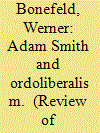

|
|
|
|
|
| Publication |
2013.
|
| Summary/Abstract |
In the context of the contemporary crisis of neoliberal political economy, the politics of austerity has reasserted the liberal utility of the state as the political authority of market freedom. This article argues that economy has no independent existence, and that instead, economy is a political practice. It examines the political economy of Adam Smith and the German ordoliberal tradition to decipher the character of the political in political economy and its transformation from Smith's liberal theory into neoliberal theology. Ordoliberalism emerged in the late 1920s at a time of a manifest crisis of political economy, and its argument was fundamental for the development of the neoliberal conception that free economy is matter of strong state authority. The conclusion argues with Marx that the state is the concentrated force of free economy.
|
|
|
|
|
|
|
|
|
|
|
|
|
|
|
|
| 2 |
ID:
120466
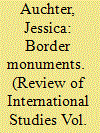

|
|
|
|
|
| Publication |
2013.
|
| Summary/Abstract |
Immigrant deaths have increased in recent years due to changes in border enforcement practices, yet less attention has been paid to the memorialisation of undocumented immigrants who die crossing the US-Mexico border. This article explores the ordering mechanisms of statecraft through an examination of how the dead bodies of undocumented migrants pose a resistance to these mechanisms. I first lay out my conception of statecraft and the bordering practices involved in this specific context, then address the memorialisation of undocumented immigrants who lost their lives crossing the border. The article embarks on a journey through anonymous desert gravesites and small desert cemeteries haunted by the spectres of immigration. It explores the contestation surrounding memorialisation of death through the monument, the narratives of anonymity surrounding the memorialisation of undocumented immigrants, and the counter-memory discourses that emerge in an effort to rewrite the meaning of these migrant deaths. These counter-memorial discourses, I argue, posit desert border monuments as a threat to statecraft because they cannot be situated within the (b)ordering mechanisms of the state.
|
|
|
|
|
|
|
|
|
|
|
|
|
|
|
|
| 3 |
ID:
120465
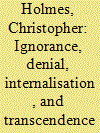

|
|
|
|
|
| Publication |
2013.
|
| Summary/Abstract |
In this article, I suggest what an engagement between post-structuralism and the work of Karl Polanyi might look like. I do this by presenting a reading of Polanyi's concept of 'double movement' as a form of problematisation through binary opposition. I suggest that the central opposition that the double movement depicts - between economy and society as reflected in processes of marketisation and social protection - presents itself in such a way that the problems emanating from the opposition can only be solved through its transcendence. On one hand, the terms of transcendence are limited by the terms of the opposition. On the other hand, since transcendence is never reached, the double movement problematisation stabilises the existence of a lacuna between the lived experience of market society and the discursive field of that market society. As such, the form of the problematisation places a double-limit upon the ways in which 'solutions' can be presented. I present this thesis in relation to two instances of double movement discussed by Polanyi in his book, The Great Transformation. I then apply the argument to invocations of the economy-society opposition in contemporary political economic discourse, where it remains as ubiquitous as ever.
|
|
|
|
|
|
|
|
|
|
|
|
|
|
|
|
| 4 |
ID:
120470


|
|
|
|
|
| Publication |
2013.
|
| Summary/Abstract |
Ex-combatant reintegration programmes are buttressed by a number of problematic assumptions about ex-combatants themselves; namely, that ex-combatants should not receive long-term support because such assistance would amplify the threat they pose to security and exacerbate community resentment towards them. The article uses data collected from Liberia to demonstrate that such thinking stigmatises ex-combatants and works against the objective of reintegration: it disrupts integration into the everyday social, economic, and political life of the post-conflict state and aims instead to render ex-combatants separate from communities. Integration will remain elusive unless assumptions about ex-combatants as programme beneficiaries are challenged.
|
|
|
|
|
|
|
|
|
|
|
|
|
|
|
|
| 5 |
ID:
120471
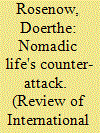

|
|
|
|
|
| Publication |
2013.
|
| Summary/Abstract |
According to opponents of 'neoliberal globalisation' located in the postcolonial realm, multinational corporations are central agents in a structure of global hegemonic rule that leaves little or no space for the postcolonial subject to determine his/her own fate. This argument is contested by a number of scholars, who point out that presupposing a lack of agency on the side of subaltern is yet another way of silencing him/her. But how can his/her 'true' voice be recognised without at the same time disguising existing domination? In this article, it will be argued that one possibility is the development of a different theoretical framework that challenges the taken-for-granted assumption on which the dilemma is based: the existence of the subject and its conscious voice. For this purpose, the article will use Gilles Deleuze's theory of the various expressions and struggles of life. With the help of the analysis of a particular case, Monsanto's introduction of genetically modified cotton into India in 2002, the article will suggest that the multinational company (Monsanto) should not be regarded as yet another neo-colonial oppressor. Instead, it is a war machine that unleashes flows enabling nomadic life assemblages to counter-attack.
|
|
|
|
|
|
|
|
|
|
|
|
|
|
|
|
| 6 |
ID:
120468
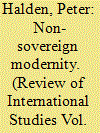

|
|
|
|
|
| Publication |
2013.
|
| Summary/Abstract |
Social theory almost invariably equates modernity with the sovereign state. This equation must be nuanced because the modern era and modern strategies of international stability have contained non-sovereign units. In the nineteenth century, the Great Powers tried to create international stability by engineering forms of rule in Europe. These strategies built on distinctively modern ideas: the possibility of radically breaking with the past, redesigning political organisations, and actively controlling political events through rational planning. Throughout the century the Great Powers alternated between creating non-sovereign units and creating sovereign units as instruments in these stabilising strategies. The degree of trust between the Great Powers accounts for the shift between the two strategies: they tended to create non-sovereign units when mutual trust was high and sovereign ones when trust was low. This article analyses Great Power strategies of designing forms of rule in the Balkans between 1820 and 1878. Like in previous centuries, nineteenth-century Europe actually consisted of two parallel but connected systems: the egalitarian system of sovereign states and a system of non-sovereign entities. Non-sovereign units disappeared only late in the century and this process was affected by the increasing rivalry and mistrust between the sovereign states.
|
|
|
|
|
|
|
|
|
|
|
|
|
|
|
|
| 7 |
ID:
120472


|
|
|
|
|
| Publication |
2013.
|
| Summary/Abstract |
This article introduces reasonable force as ontological to the performance of late modern police power. It argues that policing emerged through reasonable force as an innovation of military power and as a supplement to legal power. The article tracks the development of reasonable force in late modern policing through to its emergence as a vanguard strategy of post-Cold War global governance. Police power, the article finds, has transformed traditional sovereign power relations to incorporate governmental power. It finds policing power to be an expansive reforming force that exhibits a dynamic capacity to provide relational coherence to multi-layered policing constellations from the local to the global.
|
|
|
|
|
|
|
|
|
|
|
|
|
|
|
|
| 8 |
ID:
120469
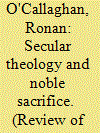

|
|
|
|
|
| Publication |
2013.
|
| Summary/Abstract |
The last decade has witnessed an attempt to solidify debate on war around the dichotomy of just war and holy war. In this dichotomy, the just war has increasingly been depicted as the progressive secularised opposite to holy war's antiquated religious fundamentalism. While wars argued for under the just war banner have been extensively critiqued and protested against, the rights based language of just war theory has largely escaped critical evaluation. Michael Walzer has emerged as a pivotal figure in just war theory's modern, secular rebirth within the discipline of International Relations. Walzer's theory argues the language of just war theory provides an effective means for us to engage with the moral reality of war. Drawing upon the work of Jacques Derrida this article investigates the construction of Walzer's moral language and its ethical implications. The first section focuses on Walzer's moral language; its structure, inconsistencies, and theological underpinnings. The second section addresses how Walzer employs this language to justify the sacrifice of combatants in defence of non-combatants. The central arguments presented in this article are that Walzer's theory is inconsistent in itself, and that the sacrifices initiated by this language constitute the unjustified sacrifice of just war theory's own ethical principles.
|
|
|
|
|
|
|
|
|
|
|
|
|
|
|
|
| 9 |
ID:
120464
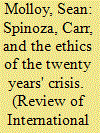

|
|
|
|
|
| Publication |
2013.
|
| Summary/Abstract |
This article reads Carr through the lens of Spinoza's ethics, and Spinoza through the prism of Carr's IR Theory. The argument of the piece is that there are significant parallels in the ethical projects of both writers, which upon further examination reveal important aspects of global political life and the nature and limits of ethics in International Relations. The close, critical examination of Spinoza ad Carr undertaken in this article also sheds light on the most controversial aspect of Carr's career, his advocacy of appeasement in Nazi Germany.
|
|
|
|
|
|
|
|
|
|
|
|
|
|
|
|
| 10 |
ID:
120467
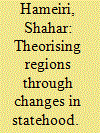

|
|
|
|
|
| Publication |
2013.
|
| Summary/Abstract |
The study of regionalism is often characterised as too fragmented, plagued by disagreements over such fundamental matters as its ontological and epistemological premises, which also hinder efforts at substantive comparison of regionalisation processes. In this article it is argued that to overcome these problems, what is required is a more rigorous incorporation of such studies within relevant work in state theory and political geography. The key insight herein is that regionalism should not be studied separately from the state as these are interrelated phenomena. State-making and regionalisation are both manifestations of contested political projects aimed at shaping the territorial, institutional, and/or functional scope of political rule. Furthermore, the article also distils the lines of a mechanismic methodology for comparative regionalism. Its main advantage is in overcoming the implicit benchmarking of regional development we find in other approaches. The framework's utility is then demonstrated through a comparison of regional governance in Asia and Europe.
|
|
|
|
|
|
|
|
|
|
|
|
|
|
|
|
|
|
|
|
|